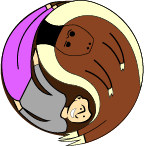the short of it:
Strength from below nurtures life, from above nurtures death.

76. Against Strength.
[People] in [their lives are] supple and tender, in [their] death [they are] rigid and strong. It is the same with everything. Grass and trees are, in their life, weak and tender, and, in their death, withered and tough. Therefore the rigid and the strong are the attendants of death; and the tender and weak the attendants of life. Hence the warrior, when strong, does not conquer. When a tree is strong, it becomes a mere support: the strong and big must stay below, while the tender and weak stay above.
76. ‘A Warning Against (Trusting In) Strength.’
76.1 [People] at [their] birth [are] supple and weak; at [their] death, firm and strong. (So it is with) all things. Trees and plants, in their early growth, are soft and brittle; at their death, dry and withered.
76.2 Thus it is that firmness and strength are the concomitants of death; softness and weakness, the concomitants of life.
76.3 Hence [those] who ([rely] on) the strength of [their] forces [do] not conquer; and a tree which is strong will fill the out-stretched arms, (and thereby invites the feller*.)
76.4 Therefore the place of what is firm and strong is below, and that of what is soft and weak is above.
*lumberjack
76. Beware of Strength.
76.1 [People] during life [are] tender and delicate. When [they die they are] stiff and stark.
76.2 The ten thousand things, the grass as well as the trees, while they live are tender and supple. When they die they are rigid and dry.
76.3 Thus the hard and the strong are the companions of death. The tender and the delicate are the companions of life.
Therefore [those] who in arms [are] strong will not conquer.
76.4 When a tree has grown strong it is doomed.
76.5 The strong and the great stay below. The tender and the delicate stay above.
Lao-tze. Suzuki, D.T. and Carus, Paul. The Canon of Reason and Virtue: Lao-tze’s Tao Teh King. United States: Open court publishing Company, 1913.

The Death Chapters (Part 4):
Chapter 76 of the Tao Te Ching is the final chapter of Lao Tsu’s Death Chapters (73-76), and is a refreshingly light capper to what has been serious subject till now.
The paradox this time is hidden inside a simple metaphor about how to nurture the most out of life.
Living things are soft and pliable, dead things become hard and brittle. Trees are a good example of this. They might have a strong trunk and give life to many supple branches, but they’re their own worst enemy. The stronger and bigger they get, the more attention they draw from the lumberjack.
So if strength is to prevail it must remain “soft and pliable” (Wang 184): a cleverly hidden paradox within the paradox.
But the main paradox is in the last line. Life (sprouting above) comes from death (which remains below). They are interchangeable only at each others expense.
Lao Tsu’s Death Chapters as they apply to government policy (see individual commentaries):
Chap 72 (prologue): Despising the people teaches people how to despise. Chap 73: Have compassion for people because they'll all be dead soon anyway. Chap 74: Threatening people with death is inefficient and dangerous. Chap 75: Over taxing and over-policing people will seal your own doom. Chap 76: Nurture people by keeping what is strong minimal and hidden (low).
-TB
